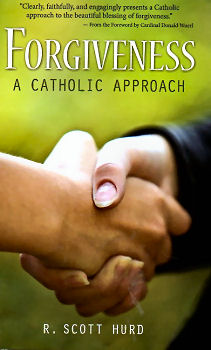
|
Posted September 18, 2011
Book: Forgiveness: A Catholic Approach Author: R. Scott Hurd Pauline Books and Media. Boston, MA. 2011. Pp. 122 An Excerpt from the Jacket:
A practical guide to understanding forgiveness The seven characteristics of forgiveness Scripture and stories that illustrate the process of forgiveness Tips for avoiding common pitfalls on the road to forgiveness A ten-step process toward forgiveness An Excerpt from the Book: As happens with so many young adults, a seventeenth century Portuguese shepherd and soldier drifted away from the faith. One day, however, during a big religious festival, he heard a powerful homily preached by Blessed John of Avila. Right in the middle of the crowd, the young man began to cry out loud, beat his breast, and scream for mercy at the top of his lungs. He continued this behavior for months. He became a public nuisance, wandering the streets and pleading for forgiveness. The locals concluded that he was insane and had him shut up in a local asylum. John of Avila learned of this and paid him a visit. He convinced the young man that he’d punished himself long enough. It was time for him to spend his energies on something positive that would benefit both himself and his neighbors. The young man took his advice, and he dedicated the rest of his life to serving the sick and the poor. We know him today as St. John of God. . . . True repentance involves positive change, not being consumed with regret. It involves turning away from sin with trust and hope in God’s mercy and forgiveness. Repentance also requires that we forgive ourselves, as God forgives us. As C.S. Lewis once wrote, “If God forgives us, we must forgive ourselves. Otherwise it is almost like setting ourselves up as a higher tribunal than God.” . . . By not forgiving ourselves, we become consumed by shame and guilt, and we are burdened with regrets over past choices. We’ll say things like, “If only I’d done this” or “If only I hadn’t done that.” Perhaps we’ve engaged in self-destructive behavior like heavy drinking or compulsive gambling. Maybe we made poor choices when raising our children or caring for elderly parents. It could be that we’re tortured over past sexual indiscretions or an abortion. Possibly we made poor financial or career choices, rushed into an ill-advised relationship, or contributed to a relationship’s failure. Or it could be that we didn’t do something we should have, such as intervening in a family crisis or stopping a friend from driving drunk. . . . Failure to forgive ourselves is a self-inflicted wound. It’s normal to feel bad when we’ve hurt others or hurt ourselves, but feeling bad is different from self-pity. When we fail to forgive ourselves, we wind up feeling sorry for ourselves. Then we’ll want others to feel sorry for us too, because we’re so miserable. At every turn we find ourselves sending out invitations to our own pity party. For consolation, we might turn to alcohol, drugs, or food. Or, like John of God, we turn on ourselves, imposing unnecessary penances. God doesn’t want us doing unnecessary penances. There are, however, appropriate penances he’s happy for us to do, things that add love and goodness to a world we’ve darkened through our sins. For instance, if we’ve hurt another person, we can apologize to him or her. Even if that person doesn’t accept our apology, we’ve at least taken responsibility for our actions. We can also try to make amends for the things we’ve done. Perhaps we can do something kind for the person we’ve hurt, or, if that isn’t possible, we can do something kind for someone else. The best way to feel good is to do good. That’s what John of Avila counseled John of God to do. It worked, and John of God was transformed from desperation into sainthood. Table of Contents: Why Forgive? 1. A lovely idea? 2. Forgive for you 3. Forgive others 4. Forgive for God Hallmarks of Forgiveness 5. No fair! 6. No exceptions 7. No strings attached 8. Forgive and forget? 9. Don’t be a doormat 10. Kiss and make up? 11. All things are possible How to Forgive 12. Pray it through 13. Receive God’s forgiveness 14. “Bless me, Father . . .” 15. Broken bread for broken people 16. Forgive yourself 17. Walk in their shoes 18. Lower the bar 19. What did I do? 20. Get mad, just don’t get even 21. Let’s talk about it 22. Keep on keeping on 23. Check your pulse 24. The choice is ours Appendix: a final word. . . about where to begin |
|
